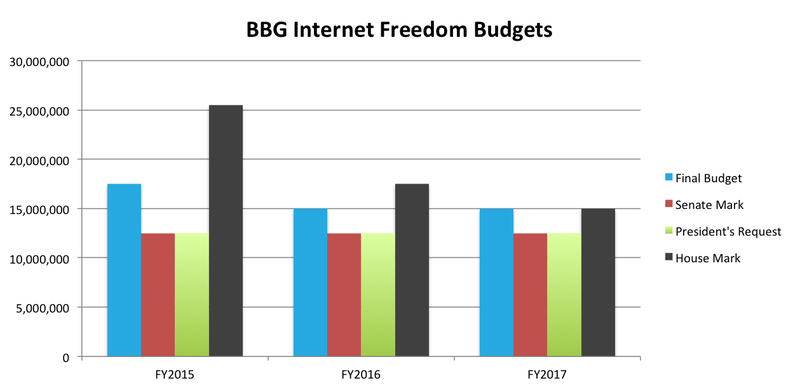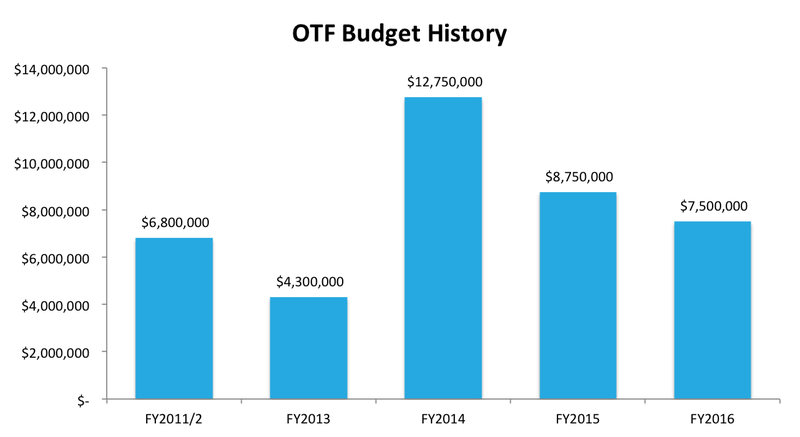Congress last week passed the fiscal year 2017 Omnibus Appropriations bill, which provides funding for the federal government for the remainder of the current fiscal year (through September 30, 2017). The Omnibus includes 11 different appropriations bills, with internet freedom funding detailed in the appropriations bill for State and Foreign Operations.
For FY2017, Congress once again called for $50.5 million for “programs to promote Internet freedom globally,” designating $15 million for the Broadcasting Board of Governors (BBG), the federal agency through which OTF’s funding is appropriated, and $35.5 million for the Department of State. These funding levels have been consistent since FY2014 when the total was increased from $34.1 million the previous year.
OTF’s portion of internet freedom funds derive from those appropriated to the BBG. In FY2016, OTF received half of the BBG’s $15 million internet freedom budget. While maintaining the same overall budget level may not seem noteworthy, the previous Administration’s budget submission, inclusive of the BBG, had repeatedly requested reducing the internet freedom budget to $12.5 million. In previous years, the Senate has initially set forth internet freedom budget marks at the levels requested by the Administration while the House of Representatives has repeatedly sought substantially higher funding levels, with the final budget for internet freedom typically ending up somewhere in the middle. For FY2017, the House of Representatives recommendation dropped to $15 million – ultimately the final figure, as seen in the following chart.

Beyond the overall amount allocated, numerous noteworthy changes did occur in the underlying language for FY2017. While Congress allocated the amount put forth by the House, the text of the bill itself relied largely on what was put forth by the Senate. This led to two important changes that will affect OTF’s operations this year.
The final budget included language that explicitly designates $1.2 million to OTF parent organization Radio Free Asia (RFA) “for the personnel costs associated with Internet freedom activities.” This language not only ensures that timeliness of funds release will no longer be an issue for OTF operations, but also marks the first time the appropriations language formally recognizes the ongoing work of the Open Technology Fund program at RFA. Given that OTF’s overall overhead has been about 10 percent, we hope to have a project budget at a commensurate amount restoring the program to previous funding levels.
Both the BBG and the State Department Internet Freedom program have relied on the same remit language since its original inclusion in 2014. As a result, OTF and the State Department have worked in close coordination to maximize the impact of our respective funds while ensuring no wasteful duplication of support. The FY2017 legislative language changes this approach, instead designating separate remits for each of the two complementary efforts.
This year’s BBG internet freedom funds have the following scope:
(A) made available only for tools and techniques to securely develop and distribute BBG digital content; facilitate audience access to such content on Web sites that are censored; coordinate the distribution of BBG digital content to targeted regional audiences; and to promote and distribute such tools and techniques, including digital security techniques; [emphasis added]
(B) coordinated with programs funded by this Act under the heading ‘‘International Broadcasting Operations’’, and shall be incorporated into country broadcasting strategies, as appropriate;
(C) coordinated by the BBG CEO to provide Internet circumvention tools and techniques for audiences in countries that are strategic priorities for the BBG and in a manner consistent with the BBG Internet freedom strategy;
(D) made available for the research and development of new tools or techniques authorized in paragraph (A) only after the BBG CEO, in consultation with the Secretary of State and other relevant United States Government departments and agencies, evaluates the risks and benefits of such new tools or techniques, and establishes safeguards to minimize the use of such new tools or techniques for illicit purposes.
While this language differs in multiple respects from that of previous fiscal years, OTF does not view it as limiting any aspects of our current operations which have always sought to further internet freedom for at-risk sources, subjects, researchers, journalists and consumers of BBG digital content. Rather, the updated language simply provides additional guidance from Congress on how they distinguish between these two internet freedom programs. This is further affirmed by the fact that the final budget amount provided was again higher than the President’s Request and the Senate mark.
Nonetheless, the additional language around “establish[ing] safeguards” differs slightly from the language in previous years which requested “a description of safeguards” or “an assessment of the…safeguards” to be submitted in a report to Congress prior to the initial obligation of funds. OTF has long included numerous questions and considerations throughout its application and review process to evaluate potential safeguards of any new technology being considered for support. This process not only “evaluates the risks and benefits” of each project but also ensures it is focused on serving at-risk users in repressive environments, such as the audiences of BBG broadcasters like RFA and RFE/RL. Of particular significance, the Senate Appropriations Committee stated in its report language that “[c]ircumvention technology alone does not further Internet freedom abroad, and the Committee acknowledges the difficulties in monitoring and conducting oversight of the use of such technology.”
The BBG CEO will soon be approving a budget for the BBG’s FY2017 Internet freedom funds. This budget will establish the funding OTF ultimately receives and the efforts to be supported by these funds. For reference, in previous years OTF has generally received half of the project-based IF funding allocated to the BBG. We will provide an update when the FY2017 figure is finalized. Given the continued decline in global internet freedom and the fact that OTF’s first two concept note rounds of 2017 were the highest in program history (with nearly 200 concept notes received), we are confident that OTF is well situated to meet this demand and maximize the effectiveness of as much funding as can be allocated to the program.

With the continued legislative guidance provided by Congress, OTF looks forward to carrying out its work supporting the research, development, and implementation of open technologies that increase free expression, circumvent censorship, and obstruct repressive surveillance as a way to promote human rights and open societies.
The full bill text can be found here.

